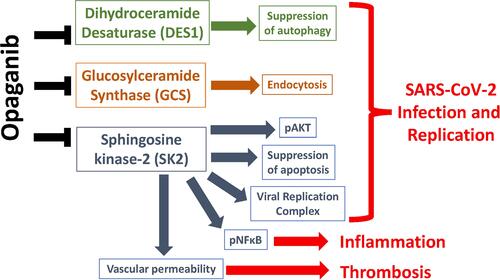Figures & data
Figure 1 Multitargeting of sphingolipid metabolism by opaganib. Opaganib (aka ABC294640; Yeliva®; 3-(4-chlorophenyl)-N-(pyridin-4-ylmethyl)-1-adamantanecarboxamide, hydrochloride salt) inhibits SK2 decreasing S1P synthesis, DES1 elevating dihydroceramides, and GCS reducing hexosylceramides.

Table 1 Clinical Studies of Opaganib
Table 2 Nonclinical Studies of Opaganib Relating to Covid-19
Figure 2 Model for the therapeutic activity of opaganib against Covid-19. Sphingolipids regulate the ability of SARS-CoV-2 to replicate and thereby cause Covid-19. Firstly, pro-autophagic dihydroceramide levels are normally maintained at low levels by DES1. Inhibition of DES1 by opaganib elevates dihydroceramides and promotes autophagy which suppresses viral replication. Secondly, hexosylceramides are necessary for the endocytosis of virus bound to ACE2. Inhibition of GCS by opaganib reduces hexosylceramides thereby impairing the ability of the virus to enter target cells. Thirdly, SK2 regulates several signaling pathways, as well as the viral replication complex, that are required for viral replication. Inhibition of SK2 by opaganib therefore has multifaceted suppressive effects on viral infection and replication. Furthermore, opaganib suppression of inflammation and thrombosis mediated by SK2 may protect against multi-organ dysfunction in Covid-19 patients.

